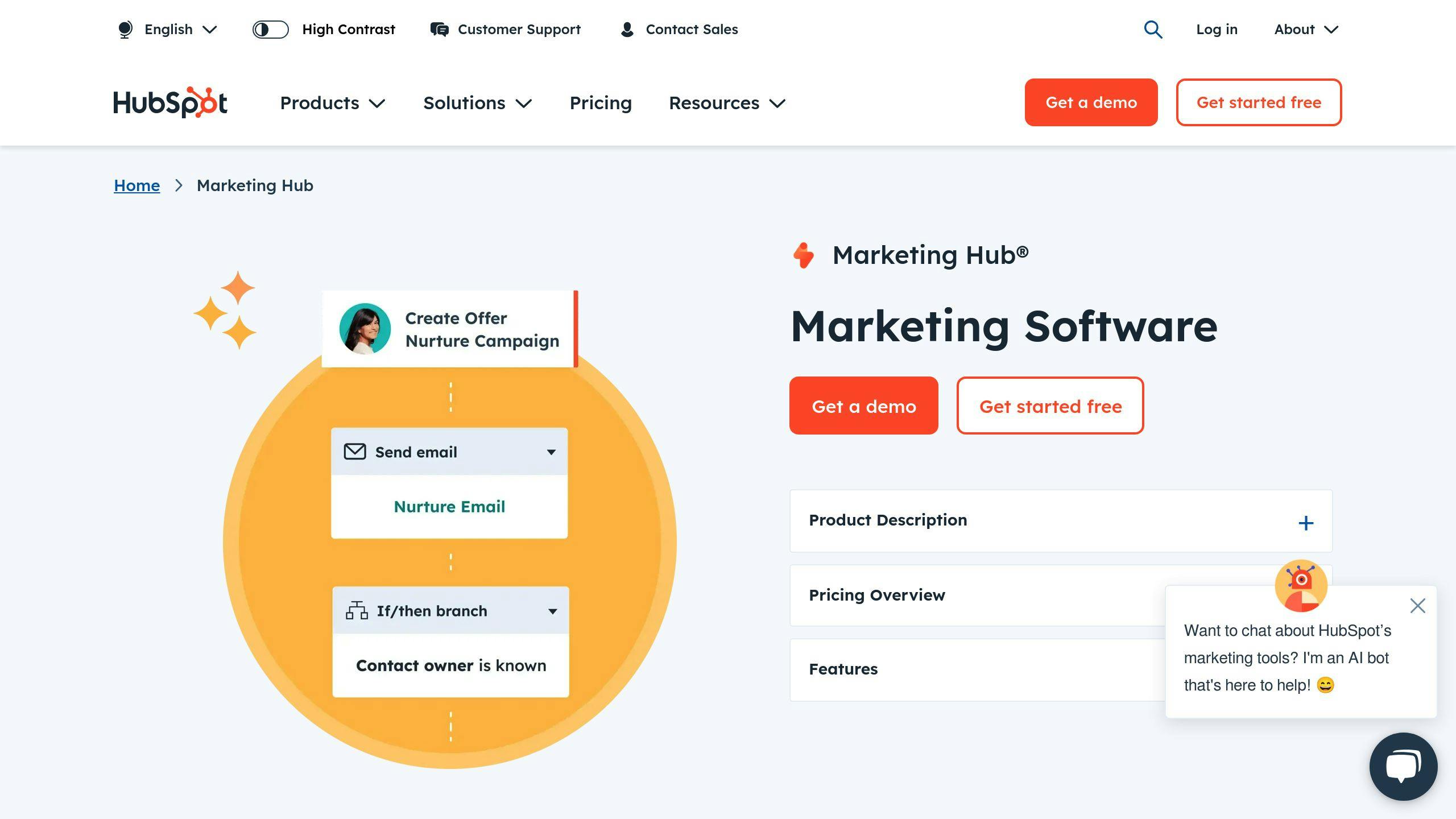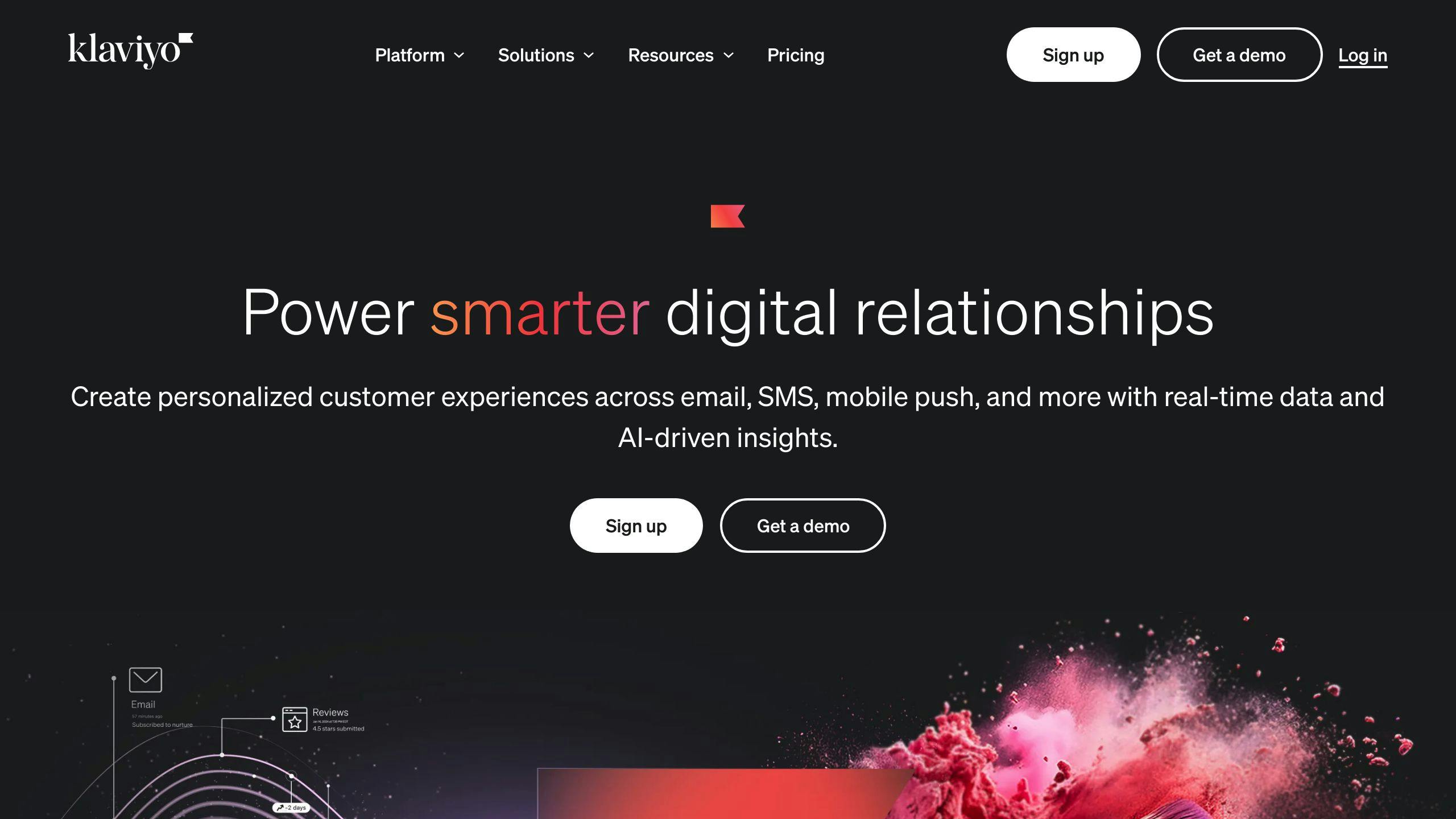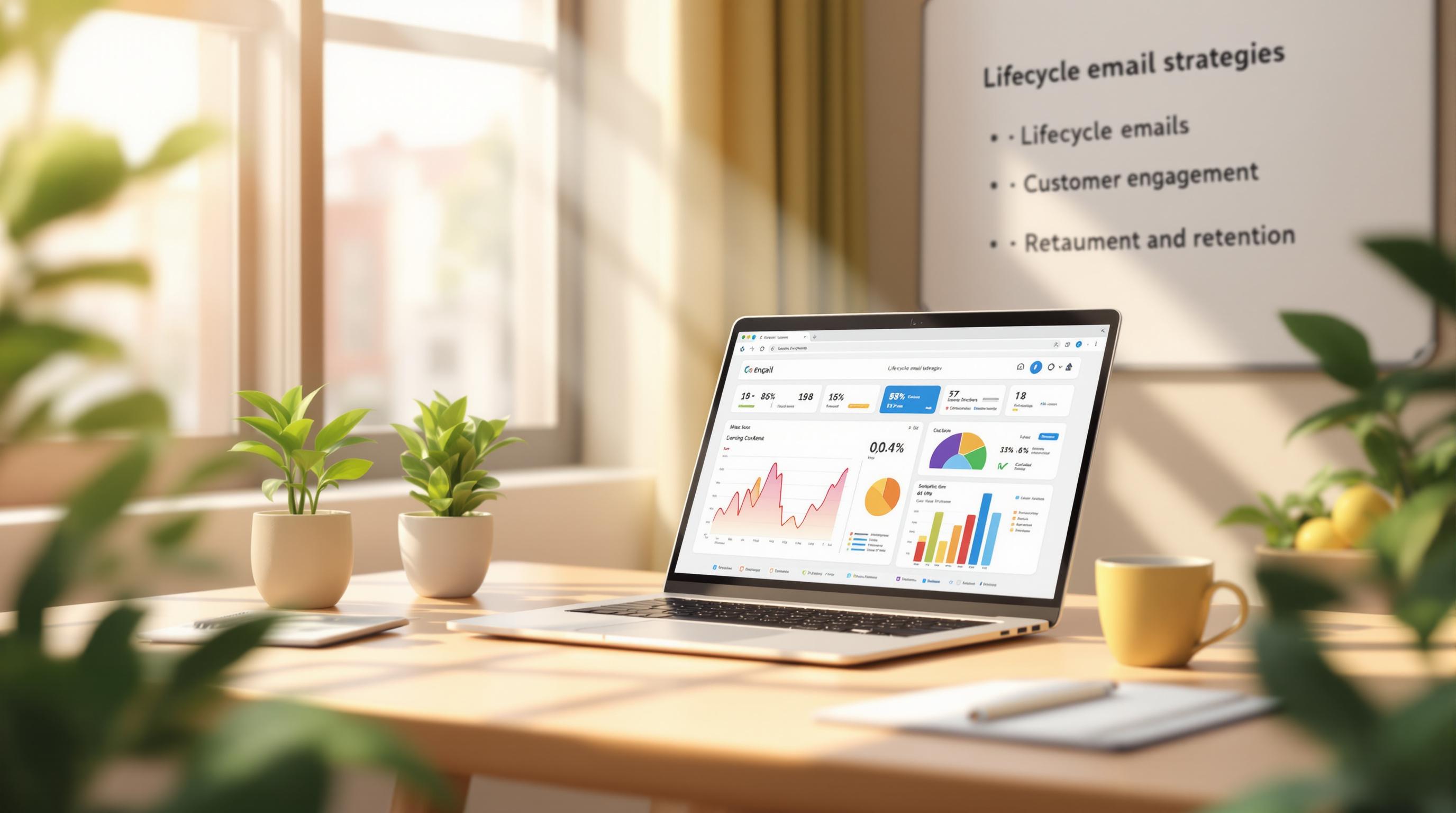Looking to pick an email marketing platform for your B2B company or non-profit? Here's what you need to know:
Top Platforms & Starting Prices:
- HubSpot: $40/month (B2B focus, full marketing toolkit)
- Mailchimp: Free for up to 500 contacts
- Elastic Email: $29/month for 2,500 contacts
- EmailOctopus: Free for 2,500 contacts
Non-profit Discounts:
- GetResponse: 50% off
- Mailchimp: 15% off
Quick Platform Comparison:
| Platform | Best For | Key Feature | Starting Price |
|---|---|---|---|
| HubSpot | B2B & Large Teams | CRM Integration | $40/month |
| Mailchimp | Small Teams | Easy Templates | Free-$20/month |
| Elastic Email | Growing Lists | Scalability | $29/month |
| EmailOctopus | Nonprofits | Segmentation | Free |
What You'll Learn:
- Which platform fits your business size and type
- Real pricing comparisons and nonprofit discounts
- Must-have features for email compliance
- How to test platforms before buying
Email marketing delivers $42 for every $1 spent. This guide helps you pick the right platform based on your needs, budget, and growth plans - whether you're just starting or looking to upgrade your current solution.
Related video from YouTube
Key Features of Email Marketing Platforms
When choosing an email marketing platform, understanding its features can help you select one that fits your organization's needs. According to the DMA's 2020 report, email marketing delivers an average return of $42 for every dollar spent, making it essential to pick a platform with the right tools.
Email Automation Tools
The best platforms offer automation to save time while increasing engagement. For instance, HubSpot allows for detailed customer journey planning, while Mailchimp simplifies things with automated sequences like welcome messages, abandoned cart follow-ups, and milestone celebrations. These features ensure steady communication without requiring manual effort.
Customer Targeting Options
Segmentation is critical for driving engagement. EmailOctopus shines with its in-depth targeting capabilities, letting users segment markets by behavior, demographics, or interaction history. It also supports custom fields and dynamic content to create messages tailored to audience preferences.
"The key to successful email campaigns lies in precise segmentation and personalization. Our nonprofit clients using targeted messaging see open rates of 25.5% on average, significantly higher than industry standards", says the 2022 Nonprofit Email Benchmark study.
Connecting with Other Business Tools
A platform's ability to integrate with your existing systems can make or break its effectiveness. Brevo offers over 70 plug-and-play connections with popular CRMs and e-commerce tools, while HubSpot ensures seamless synchronization between marketing and sales with its built-in CRM integration.
Room to Grow
If your subscriber list is growing, scalability becomes important. Elastic Email addresses this with pricing that begins at $29 for 2,500 contacts, adapting easily as your needs grow. Its infrastructure supports higher volumes without sacrificing speed or reliability.
Email Rules and Delivery
Ensuring compliance and high deliverability is a must. Constant Contact stays on top of GDPR requirements with features for consent and preference management. It also optimizes email delivery with tools like automated bounce handling and spam testing, making sure your emails reach the right inboxes.
| Platform | Key Strength | Starting Price | Nonprofit Discount |
|---|---|---|---|
| Mailchimp | Easy-to-use automation | Free for 500 contacts | 15% off |
| HubSpot | All-in-one marketing tools | $40/month | Available |
| Elastic Email | Flexible and scalable | $29/month | Contact sales |
| EmailOctopus | Great for segmentation | Free for 2,500 contacts | Contact sales |
Popular Email Platforms Compared
Picking the right email platform can make or break your marketing efforts. Here’s a look at three leading platforms, each tailored to specific business needs.
Mailchimp Review

Mailchimp is a great choice for startups and small teams, offering a budget-friendly way to get started. Their free plan covers up to 500 contacts and allows 1,000 monthly emails, providing an easy entry point. Paid plans start at $20 per month, adding features like A/B testing and custom branding to the mix.
"Mailchimp's intuitive interface and straightforward automation tools have made it the go-to choice for small businesses. Our research shows that organizations using Mailchimp's basic automation features see an average 15% increase in engagement rates", says the 2023 Email Marketing Benchmark Report.
Mailchimp is particularly strong in these areas:
- Easy-to-use template builder
- Straightforward automation workflows
- A 15% discount for nonprofits
- WordPress integration
HubSpot Review

HubSpot is built for bigger teams that need more advanced marketing tools. Starting at $20 per month for 1,000 contacts, it’s loaded with features like CRM integration and detailed analytics. It’s a solid pick for B2B companies, especially those focusing on sales alignment and in-depth customer tracking.
Some of HubSpot's key features include:
- Built-in CRM
- Sophisticated lead scoring
- Multi-channel campaign tools
- Customizable reporting dashboards
| Feature Comparison | Mailchimp | HubSpot |
|---|---|---|
| Starting Price | $20/month | $20/month |
| Free Plan Limit | 500 contacts | Basic CRM |
| Best For | Small teams, basic needs | Large companies, complex automation |
| Nonprofit Discount | 15% off | Available upon request |
Klaviyo Review

Klaviyo sets itself apart as a data-focused platform, especially well-suited for e-commerce businesses. While pricing details aren’t publicly available, its strengths lie in tight integration with major e-commerce platforms and sophisticated segmentation options.
Top features include:
- Predictive analytics
- Detailed customer segmentation
- Seamless e-commerce integration
- Behavior-based customer tracking
For businesses with revenue between $1M and $100M, Klaviyo’s data-driven tools are great for creating highly targeted email campaigns that align with customer habits and purchase patterns.
sbb-itb-6e7333f
Top Questions About Email Platforms
Which Platform Works Best for My Business?
Picking the right email platform depends on your business type and what you aim to achieve. If you're a B2B company earning between $1M and $100M annually, you'll likely need tools with strong CRM integration and features like lead scoring. Both HubSpot and Brevo are great options, offering a blend of these features plus marketing automation.
For nonprofits, affordability and donor management are priorities. EmailOctopus is ideal, with a free plan for up to 2,500 subscribers, while Elastic Email offers flexible plans for growing organizations, starting at $29/month.
"Our research shows that organizations using integrated CRM-email platforms see a 23% higher donor retention rate compared to those using standalone email tools", shares the Email Service Business Directory's 2024 Industry Report.
How Do Platform Costs Compare?
Pricing for email platforms generally depends on three things: the size of your contact list, how many emails you send, and the features you need. Here’s a quick look at common pricing models:
| Plan Type | Cost Range | Ideal For | Features Included |
|---|---|---|---|
| Basic | $9-29/month | Small lists (<2,500 users) | Basic automation tools |
| Growth | $29-99/month | Mid-size lists (2.5k–10k) | Advanced segmentation and features |
| Enterprise | $299+/month | Large lists (10,000+) | Full API access and premium support |
What About Email Compliance?
Modern email services come with built-in tools to help you stay compliant with top regulations like GDPR and CAN-SPAM. If you're choosing a platform, look for these must-have features:
- Automatic double opt-in
- Clear, accessible unsubscribe buttons
- Easy-to-manage contact preferences
- Strong data privacy controls
Choosing Between B2B and Nonprofit Platforms
Different organizations have different needs. B2B companies typically require tools that integrate with sales pipelines and offer detailed lead scoring. Platforms like HubSpot are a strong choice, thanks to their built-in CRM tools.
Nonprofits, on the other hand, prioritize donor management and affordability. Many platforms offer nonprofit discounts. For example, EmailOctopus and Elastic Email offer budget-friendly plans tailored for growing donor bases with excellent deliverability rates.
"Nonprofits using dedicated donor management features see an average 27% increase in recurring donations compared to those using standard email tools", according to the Email Service Business Directory.
Testing Email Platforms
Using Free Trials
Most top email platforms let you test their features with free trials. HubSpot, for instance, has a free plan that includes up to 2,000 monthly emails and 1,000,000 non-marketing contacts - giving you plenty of room for an in-depth evaluation. Mailchimp offers a smaller package with up to 1,000 monthly emails to 500 contacts, still a solid choice for trying out its primary features.
"81% of small businesses rely on email as their primary customer acquisition channel", reports the Email Marketing Industry Survey 2024, "making thorough platform testing crucial for long-term success."
Help and Training
Support quality and training resources can vary widely between providers. HubSpot provides round-the-clock support and an extensive library of resources, including video tutorials and certification programs. Brevo, on the other hand, supports users via live chat during business hours and offers multilingual documentation.
| Platform | Support Hours | Training Resources | Response Time |
|---|---|---|---|
| HubSpot | 24/7 | Video tutorials, certifications, webinars | Less than 2 hours |
| Mailchimp | Business hours | Knowledge base, video guides | Less than 4 hours |
| Brevo | Business hours | Documentation, email support | Less than 6 hours |
Testing With Your Tools
Ensuring that your email platform integrates easily with your existing tools is essential for a smooth workflow. Mailchimp, which has a 4.3/5 TrustRadius rating, integrates well with popular e-commerce and CRM platforms. Meanwhile, HubSpot, earning a 4.5/5 rating on G2, offers native compatibility with over 1,000 business tools.
When testing, make sure your must-have tools connect without issues. For example, Shopify users will find that both Mailchimp and Brevo have direct integrations to sync customer data without hassle. During a free trial, try these integrations to confirm that data moves seamlessly between platforms.
"The global email marketing market is projected to grow to $17.9 billion by 2027", notes the Digital Marketing Institute, "driven by businesses seeking integrated marketing solutions that work seamlessly with their existing tech stack."
Conclusion
Selecting the best email marketing platform means aligning it with your organization's unique needs and future goals. For B2B companies and nonprofits earning between $1M and $100M annually, it's important to weigh the platform's features and ability to handle growth over time. Affordable options like EmailOctopus start at just $9 per month for unlimited emails, while tools like HubSpot cater to enterprise needs with more expansive functionalities.
"The key to successful email marketing isn't just about finding the cheapest solution - it's about finding the right fit for your organization's unique needs and growth plans", says the Digital Marketing Institute's 2024 Platform Selection Guide.
Here’s a comparison to guide your decision-making process:
| Selection Criteria | B2B Features | Nonprofit Features |
|---|---|---|
| Core Functionality | CRM integration, automation | Donor tools, event features |
| Starting Price | $29-$99/month | Often includes discounts for nonprofits |
| Growth Options | Scales with contact count | Flat-rate pricing options |
| Integrations | CRM tools | Payment systems |
Nonprofits may lean toward platforms like Constant Contact, which include donor management and event planning tools, often with special pricing. Alternatively, B2B businesses may prioritize platforms offering deep CRM integration and advanced automation.
Most services provide free trials - take advantage of these to test key functionalities using your real data and workflows. Whether you go with a simple solution like Elastic Email for $29 per month or opt for a more advanced tool, ensure it supports both your immediate requirements and long-term objectives.


